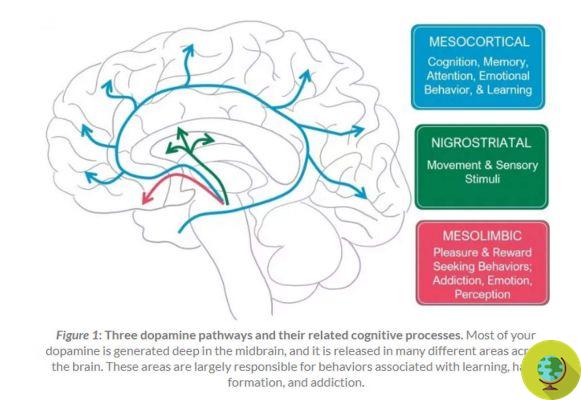Don't store avocado like this: it's dangerous
We are becoming less and less intelligent: our intellectual coefficient has been drastically worsening since the last century. To be responsible for this is, albeit in part, the technology, which has made us less and less able to focus on a single task and effectively.
A real involution now acclaimed by several studies, which show how intellectual progress lasted until the end of the 20th century, then the darkness: since then the IQ has not stopped falling.
One of the causes, according to various researches, is themassive use of technology and the tasks that our brain delegates to it. For example, our mobile phone is able to remind us of an appointment or how to get to a place. All things that make our intellectual abilities lazy.
Smart technology, in short, is actually making us less productive (or more stupid). That's right, and some scientists argue on this point: technology is really good at making us busier, true, but busy isn't the same as productive. As our dependence on technology increases, our actual productivity decreases.
This is the assumption from which various investigations start: by intelligent technology we mean any device we interact with that remodels any form of thought for us. In many ways it is fantastic, but how it makes our brains atrophy ...
In short, eyes focused on any type of notification of the thousand apps we have on smartphones, smart watches, a worrying and fictitious hyper-connection with the world that disconnects us from everyday reality. The human brain is thus forced to find a new structure on a reality different from the one that evolution has granted it until the internet has taken over everything, leaving fundamental faculties on the road.
We have tried to outline the various studies and reflections of scientists according to which the technology of the last few decades has done nothing but change the conformation of the human brain.
Index
Goodbye slow thinking
It is Lamberto Maffei, Emeritus Professor of Neuroscience at the Normale di Pisa, President of the Accademia dei Lincei, who gives us a picture as precise as it is tragic of what has always been considered a "slow" organ: our brain. According to his studies, addiction to technology is changing the neuronal structure of the brain now forced to contend with super speed of digital.
The result is that slow thinking, the one that dedicates itself to deep reflection, learning and education, is gradually wasting away: it is a physiological change, due to which the neurons of slow thinking are switched off giving space to the super fast world of smartphones, PCs, tablets and social media.
Notifications are like a drug
Every app on the phone wants to send us notifications, with the result that all we do during the day is touch icons with red dots. Research from Harvard University has shown that this constant stimulation by our devices increases the dopamine in the brain, which basically means that notifications should be considered on a par with drugs.
And the problem with drug addiction is that, just like notifications, it's really hard to get rid of.

©Harvard University
It will make you feel good for a moment, but it also makes you anxious - that's why an average person checks their smartphone 80-150 times a day according to recent research. And it goes without saying that it's hard to be productive when you stop and look at your phone every 10-12 minutes.
We are hyper-connected
This is exactly how Professor Michael Merzenich thinks, who in a special episode of PresaDiretta explained the neurological consequences of the use of technologies.
In the average of just forty seconds we jump from a chat to an Instagram photo, from one Facebook post to another, from one link to another and in one word we are hyper-connected.
Everything can be clicked, everything can be downloaded, and in an increasingly connected world, attention is waning.
“Up until 40 years ago, we scientists thought that the brain was plastic in the very early stages of childhood, but once an adult it becomes exactly like the computer you have on your desk: a permanently wired machine that could no longer be altered. It could only deteriorate - he has Presadiretta. Today we know that it is wrong that the brain is designed to be continuously and deeply modifiable. As long as you are alive, you have the option to change it. For the better, or for the worse, of course ”.

©Morrowind/Shutterstock
In the interview, Professor Merzenich invites us to reflect on what we are doing to our brain:
“We tend to think that whatever happens in here is fine and that the brain is healthy as long as we have one. But we know so little about the correlation between the health of this machine and what we cause it with our actions, that we think that any technological invention we throw at it is harmless, as long as it doesn't kill us. It's false. Technology is changing us, and it is changing right in our heads ”.
Multitasking, what a problem
We already knew that using multiple devices at the same time shrinks the brain, but in his book The Organized Mind: Thinking Straight in the Age of Information Overload, neuroscientist Daniel J Levitin pointed out that when we try to focus on more than one task, from an unread email to text messages, from smartphone to the colleague who calls us, our IQ is significantly lowered.
And not only that: a study conducted by the University of Sussex published in Plos One, which involved a sample of 75 people aged about 25, also arrived at the same result. Participants were given a questionnaire on the habits of use of different tools: newspapers, television, streaming via PC, SMS, e-mail, app. One was then performed on 40 of them magnetic resonance which highlighted how in the most multitasking people there was a smaller amount of Grey matter in anterior cingulate cortex, the area of the human brain that controls emotional and cognitive functions.
Let's remember that we connect with technology, not people
Have you ever looked around in a restaurant? Often it is nothing more than a room full of people, all seated at tables with presumably other people they know and have some level of affection, staring at a lighted screen.
Technology has made the world smaller in many ways, giving us access to everything, including the Alexandria Library of Egypt. But it has also increased the space in our relationships to the point where we no longer speak.
Perhaps the first step is to simply recognize that the more we surround ourselves with technology, the more addicted we become to it. Digital conversations are very different from those in the real world. When smart technology helps remove barriers to communication, that's a good thing; but when we replace technology with real relationships and conversations, it can have devastating consequences in the real world.
Sources: Lamberto Maffei, In praise of slowness / Harvard University / Daniel J Levitin, The Organized Mind: Thinking Straight in the Age of Information Overload / Rai Play Presa Diretta / Plos One
Read also:
- Too much time in front of cell phones, tablets and TVs radically changes children's brains, the study
- Are smartphones destroying an entire generation?
- Smartphone: so parents forget their children
- 10 reasons why kids shouldn't abuse smartphones and tablets


























